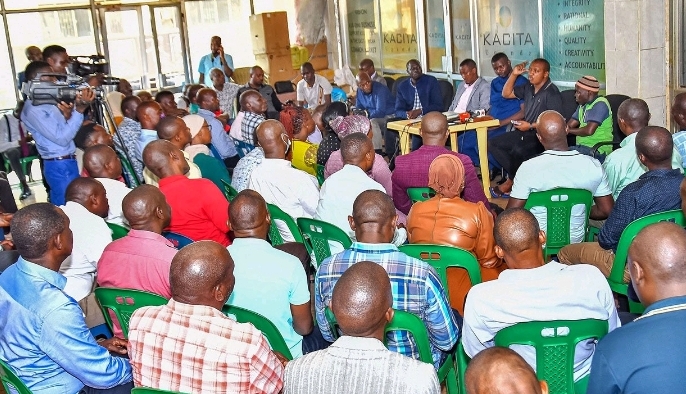A cloud of frustration is once again hanging over Kampala’s bustling business community, as city traders under their umbrella body, the Kampala City Traders Association (KACITA), announce plans to shut down their shops during the first week of November 2025.
The move, they say, is a desperate cry for help a last attempt to push government into addressing what they describe as an unfair tax system and worsening business conditions that have left many struggling to survive.
The strike, scheduled to begin on November 4, is expected to paralyze business across the city’s main trading hubs, from Kikuubo to Nakasero and downtown arcades. Traders say they are protesting not only heavy taxes, but also stiff competition from small-scale foreign traders, rising rent costs, and what they call government’s continued silence on their long-standing concerns.
Speaking with visible frustration, KACITA spokesperson Mr. Isa Sekitto said traders have held numerous meetings with government officials over the years all in vain.
“Traders have unanimously resolved that come November 4, 2025, if government doesn’t come out to resolve issues that have been pending for long, they are going to close shops until our concerns are addressed,” Mr. Sekitto said during a crisis meeting held in Kampala on October 22.
He said many traders have been pushed to the edge, battling to keep their businesses afloat amid what they view as an increasingly hostile tax environment.
“This decision wasn’t easy, but our people are in pain. We have endured too much for too long. I call upon all traders from street vendors to shop attendants to stand together in this cause,” he added.
This looming strike comes just two months after KACITA suspended a similar protest in August, following a meeting with Prime Minister Robinah Nabbanja, who pledged that government would address their grievances. But according to traders, little has changed since then.
One of the biggest sticking points remains the taxation of textiles and garments by weight, a system traders say is both exorbitant and discriminatory, disproportionately affecting small-scale importers.
“We are not against paying taxes,” one trader in Kikuubo said. “But the system should be fair. We can’t compete when we’re taxed like big companies yet we are small traders.”
In response, the Minister for Kampala and Metropolitan Affairs, Hajat Minsa Kabanda, has urged calm, saying government is already working on solutions.
“The Ministry of Trade and other responsible government agencies are handling their issues. I request the traders to continue doing business as their concerns are being addressed,” Ms. Kabanda said.
But on the streets of Kampala, skepticism remains high. Many traders say they have heard similar promises before, yet nothing tangible has been done.
For now, the city braces for what could be another tense standoff between traders and government one that threatens to bring Kampala’s vibrant commercial heartbeat to a standstill if no breakthrough is reached before November 4.


